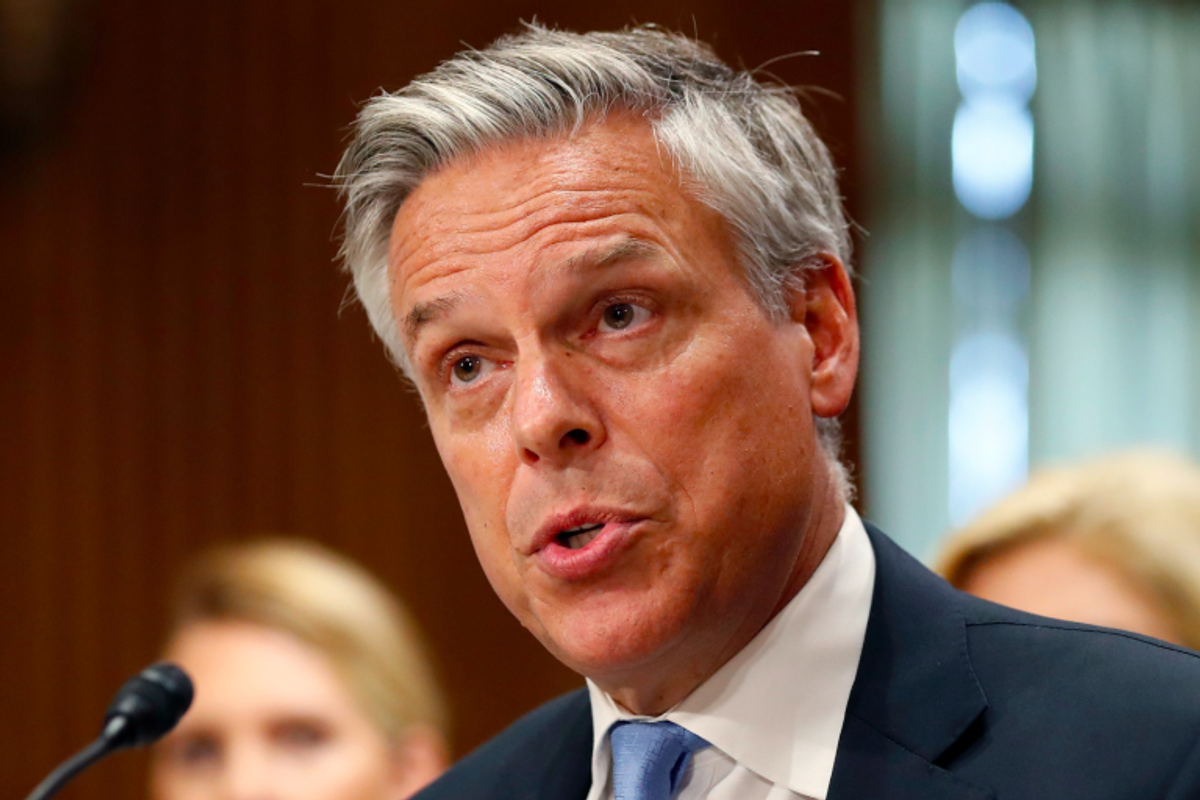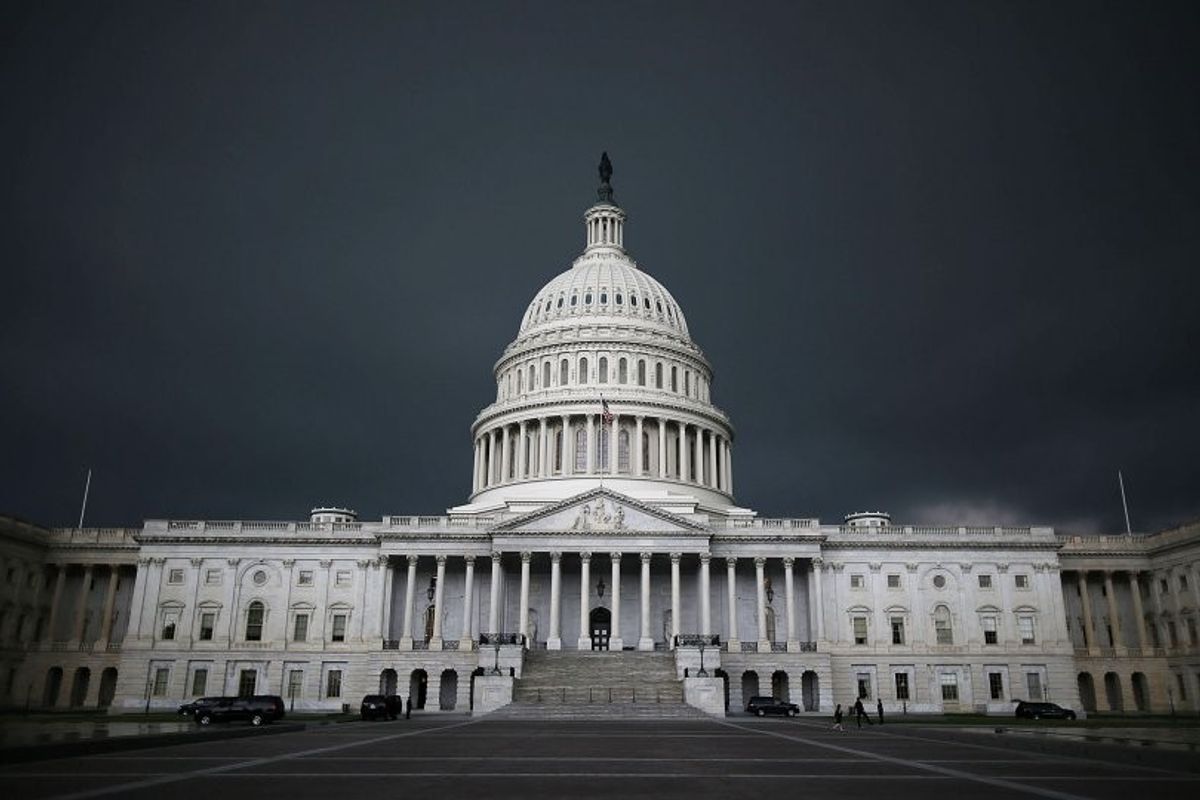President Donald Trump has made it clear that he thinks the international accord to reign in Iran’s nuclear program was the “worst deal ever.” And he has twice reluctantly certified that Iran is in compliance. But The Guardian is now reporting that the White House is pressuring intelligence officials to find that Iran is in violation of the 2015 nuclear deal, although no evidence of violation has been reported. The deal, signed by the U.S., Iran, and five other countries, has caused Iran to significantly reduce its nuclear program, in exchange for sanctions relief.
President Trump says he expects to declare Iran non-compliant by mid-October, the next time he is required to sign off on certification of the deal – the President, mandated by Congress, has to give his certification every 90 days.
In July, the last time Trump gave certification, he said, “If it was up to me, I would have had them noncompliant 180 days ago.” Afterward, Trump commissioned a group of White House aides to find a rationale for Iran’s non-compliance. Moreover, the U.S. seems to be putting pressure on the International Atomic Energy Agency (IAEA), the organization tasked with monitoring the agreement. U.S. Ambassador to the United Nations, Nikki Haley, visited IAEA headquarters in Vienna to press the agency to demand visits to Iran’s military sites.
David Cohen, a Cipher Brief Expert who served as deputy director for the CIA and undersecretary of the Treasury for terrorism and financial intelligence during the Obama Administration, told The Cipher Brief that there is serious concern this is corrupting the intelligence process.
The Cipher Brief: There are reports that the White House is pressuring the intelligence community to find that Iran is in violation of the nuclear deal. If this is true, how would the White House go about doing so - and why would it be a concern?
David Cohen: There have been reports in various publications, as well as an interview the president gave to the Wall Street Journal, in which the president made clear he expects Iran to be found to be not in compliance with the Iran nuclear deal at the next date when Iran’s compliance has to be certified. Some of the reports indicate that at the last certification point, the President had what was described as a “melt down” in the situation room when his national security team – the Secretary of State, Secretary of Defense, Chairman of the Joint Chiefs of Staff, and National Security Advisor – advised him Iran was in compliance with the nuclear deal and he should certify that fact. Coming out of that meeting, the President reportedly directed “detailed studies” to be conducted with the purpose of finding Iran was not in compliance with the nuclear deal. That's the basis for the concern.
The reason it's a concern is that it corrupts the intelligence process. The intelligence process is designed to take in all sources of intelligence, assess and analyze that intelligence, and present the best factual assessment of the situation to policymakers for their use in making their judgments. If you bake into that process the answer the policymaker is looking for, it stands that process on its head and undermines the integrity of the intelligence.
TCB: You mentioned in your Washington Post op-ed that one of the biggest risks of this is also that politicized intelligence undermines America’s ability to generate support from allies, if we were to need that support to, for example, deal with Iran not being in compliance. Can you explain that a little further?
Cohen: Sure. Let me take you back to the period when we were generating support for increasing pressure on Iran. That pressure ultimately created the leverage for the nuclear deal itself.
During that time, I was at the Treasury Department. We used intelligence that the U.S. intelligence community produced to persuade countries all around the world – from our allies in Europe, to more dubious partners like the Chinese and Russians, to many countries in the Gulf – that Iran was in fact moving forward with its nuclear program, that we had a good idea of what exactly they were doing, and furthermore that we had a good sense of what the sanctions we were doing to the Iranian economy and its ability to continue its nuclear program. Using all of that intelligence helped us generate the international support we needed to ramp up pressure on Iran and bring together a coalition of countries that then negotiated the nuclear deal with the Iranians.
We had very little pushback to our assessments at that time – the various countries trusted that our intelligence was reliable. If we begin to politicize our intelligence on Iran’s nuclear program in the fashion it appears the president has asked for, our ability to go to allies and to countries that are not close allies, and to persuade them that the Iranians are violating the deal will be seriously undermined. It will be much more difficult for us to assemble the coalition of countries working with us to put pressure on Iran, if that’s what the Administration is looking to do.
But there is a broader point, too. If other countries begin to believe our intelligence is tainted by political intervention and that our intelligence assessments are shaped by the political desires of our policy community, our ability to use that intelligence with allies and others to generate support for our foreign policy and national security initiatives is harmed. That will impair our ability to pursue a whole host of important objectives, from counter-terrorism to North Korea to China’s activities to, frankly, Iran’s destabilizing conduct in the Middle East. There are real, long-term, and wide-ranging harms that flow from politicizing intelligence.
TCB: Why would the Administration be looking to do this? What’s the motivation?
Cohen: You can look at the statements of the president during the campaign in which he criticized the Iran deal as “one of the worst deals ever made.” He has a political view that the Iran deal is not in U.S. interests, and there are others in the Administration as well who were vocal opponents of the Iran deal. So it appears that the motivation here is to support that political perspective.
TCB: Is that how you can tell when certain efforts from the White House are crossing a line from trying to get more information to politicizing intelligence? I ask because in the Guardian report today, the author talked a lot about the U.S. Administration now pressuring the IAEA to be more aggressive in some of its demands to investigate military sites in Iran. So if you didn't have the addition of Trump’s political statements on the deal, in my opinion that could be seen as a normal measure to increase oversight.
Cohen: There’s a very clear distinction between asking pointed questions and demanding a particular answer. I don’t see there being anything at all improper with the president asking the intelligence community to do everything it possibly can to develop information about Iran’s nuclear program, and if there are gaps in our intelligence, to try to fill those gaps so we have a better picture of what Iran is doing. And likewise, I see nothing wrong in asking the IAEA — which is a key component in obtaining information and assessing Iran’s compliance with the nuclear deal — to do everything it can to get a clear picture. That doesn't strike me as inappropriate.
What is concerning is having a pre-ordained conclusion irrespective of what the intelligence may show.
TCB: Do you think the intelligence community in this case with the Iran deal is better equipped or more prepared to deal with this kind of situation, given the issues over Iraq’s WMD program and that intelligence failure?
Cohen: Yes. The intelligence community has put in place a series of reforms since the Iraq WMD episode to avoid to the very greatest extent any politicization of the intelligence process. A lot of that is focused on how analysis is produced, with layers of review, a number of different mechanisms where analysts can bring up concerns about potential politicization, and an overall awareness of the importance of the intelligence process not being politicized. That's one aspect where we are in a good shape to have a clear view of Iran’s compliance.
The other is the Iran deal itself, with the IAEA inspections that are a key component of the deal, in addition to our own collection efforts and those of our allies. This all gives us an unprecedented window into what Iran is doing in its nuclear program.
So both on the intelligence collection and analysis parts of the equation, we’re in a very good place to have a reliable assessment of Iran’s compliance with the nuclear deal.
TCB: Do you have any final thoughts on this?
Cohen: With the president himself having expressed a view on what the intelligence should show, it puts a special obligation on the leaders of the intelligence community – the Director of National Intelligence Dan Coats and Director of the CIA Mike Pompeo – to ensure that the analytic process is free from political taint. They need to ensure that analysts are able to put forward their best assessment of the situation without any fear that if it doesn’t comport with the President’s desires, the analysts will not face any sort of retribution or blow-back. It’s critical that the integrity of the process is protected and the apolitical nature of the intelligence community’s work is maintained.









